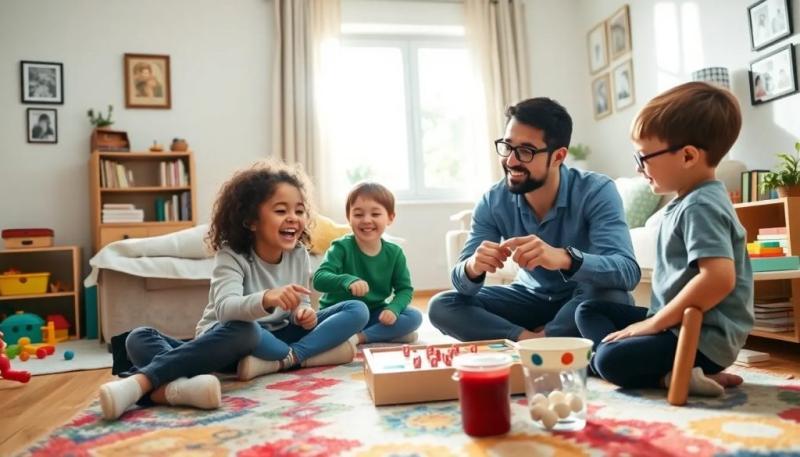10 tips for divorced parents and their nannies
When it comes to hiring babysitters for divorced parents, it’s crucial to consider the unique challenges they face. Here are some practical tips that can make a significant difference:- Maintain open communication: Regularly update each other about the children’s needs and schedules.
- Set clear boundaries: Establish what the babysitter can and cannot discuss with each parent.
- Be proactive: Anticipate potential issues and address them before they escalate.
How to be the best nanny or sitter for a family during divorce
Being a nanny during a divorce means stepping into a sensitive role. Here are ways to ensure you are providing the best care possible:1. Be empathetic: Understand that children may exhibit a range of emotions during this time. Your patience and understanding can make a significant impact. 2. Stay neutral: Avoid taking sides or discussing personal opinions about either parent. This can help children feel safe and secure.3. Encourage expression: Allow children to express their feelings and reassure them that it’s okay to feel sad or confused about the changes in their lives.By focusing on these qualities, nannies can create a supportive environment where children feel comfortable navigating their emotions.#1: Communication is key
Effective communication is essential for everyone involved—parents, nannies, and children. Establishing a clear line of communication helps to ensure everyone is on the same page.- Daily check-ins: Regularly communicate with both parents about any updates or concerns regarding the children.
- Use technology: Consider utilizing apps or shared calendars to keep track of schedules and important events.
- Document important information: Keep notes about the children’s behavior, routines, and any significant changes in their lives.
#2: Your nanny is not the messenger
It's crucial for everyone involved to understand that the nanny is not a messenger between the two parents. This can lead to unnecessary pressure on both the caregiver and the children.Encourage both parents to communicate directly with one another about any issues related to the children. This can help to prevent misunderstandings and ensure that decisions are made collaboratively. A nanny should focus on providing care and support rather than acting as a go-between.
By establishing this boundary, nannies can help children feel less caught in the middle and more secure in their relationships with both parents.
#3: Create a master calendar
Managing schedules can be chaotic for divorced families. A master calendar can serve as a central tool for organizing everyone’s commitments.Consider including major events, activities, and appointments. This visual representation can help everyone stay informed about the children’s routines.
Also, make sure to involve both parents in this process to foster a sense of collaboration. When everyone is aware of the schedule, it can significantly reduce stress during transitions.
#4: Keep the kids’ environments familiar
Children thrive in familiar environments, especially during times of change. It’s essential to maintain consistency in their surroundings.- Keep belongings consistent: Ensure that each home has the children’s favorite toys and possessions to help them feel comfortable.
- Establish routines: Try to keep meal times, homework, and bedtime consistent between both households.
- Foster continuity: Encourage the same activities or rituals in both homes to create a sense of stability.
#5: Check your attitude at the door
As a nanny, it’s vital to check your personal feelings about the divorce at the door. Children are highly perceptive and can pick up on tension.Maintain a positive and supportive demeanor, even if there are challenging situations outside your control. This will help children feel safe and loved in your presence.
Remember, your role is to provide a nurturing environment where children can express themselves without fear of judgment.
#6: Be clear and concise with your nanny
When hiring a nanny, it’s vital to outline expectations clearly. This clarity can help prevent misunderstandings down the line.- Set clear job descriptions: Outline specific duties and responsibilities related to the children’s care.
- Discuss objectives: Clearly communicate your goals for your children’s development and well-being.
- Regular reviews: Schedule regular check-ins to discuss how things are going and make adjustments as necessary.
#7: Let everyone in your children’s lives know
It’s essential that everyone involved in your children's lives is aware of their situation. This includes teachers, coaches, and other caregivers.By informing them about the divorce, they can be more understanding of any changes in your children’s behavior and needs. This awareness can foster a supportive environment outside of the home.
Encourage schools and extracurricular activities to communicate directly with both parents to ensure that everyone is informed and involved.
#8: Clarify your nanny work agreement
A well-defined work agreement can set clear expectations for your nanny. This should include work hours, payment, and specific duties.- Discuss payment details: Be upfront about payment methods and frequency to avoid confusion later.
- Outline working hours: Clearly define when the nanny is expected to work, including any possible overtime situations.
- Include emergency protocols: Discuss how to handle emergencies or unexpected events that may arise.
#9: Keep track of the money
Financial matters can often lead to tension during a divorce. It’s important to maintain clear records of any payments made to the nanny.Consider using budgeting tools or apps to track expenses related to childcare. This can help ensure that both parents are aware of how funds are being allocated.
Reviewing financial arrangements regularly can help prevent disputes and ensure that both parents are on the same page.
#10: Qualities of nannying for divorced parents
Certain qualities are essential for nannies working with divorced families. Here are a few key attributes:- Flexibility: Be prepared to adapt to changing schedules and family dynamics.
- Empathy: Understand the emotional challenges faced by children during this time.
- Strong communication skills: Maintain open and honest dialogue with both parents.
Managing changes to your nanny or sitter job during divorce
Changes in family dynamics can lead to shifts in the nanny’s role. It’s essential to remain adaptable and open to evolving responsibilities.Regularly reassess the children’s needs as the family navigates through the divorce. By staying attuned to their emotional state, nannies can fine-tune their approach to provide the best support possible.
Developing strong relationships with both parents can also help facilitate smoother transitions. Open communication can make it easier to manage changes in schedules and responsibilities.
How to support kids during a divorce
Supporting children through a divorce requires a multifaceted approach. Here are some effective strategies:- Encourage open dialogue: Let children know it’s okay to talk about their feelings.
- Provide stability: Maintain consistent routines to help children feel secure.
- Be patient: Understand that children may take time to adjust to changes.
What not to do as a nanny or sitter during a divorce
There are several pitfalls that nannies should avoid to ensure a healthy environment for children during a divorce.First, try not to involve children in adult conversations or conflicts. This can put undue stress on them and make them feel caught in the middle.
Second, avoid making negative comments about either parent in front of the children. Maintaining a neutral stance fosters a healthier environment for emotional growth.
Questions related to babysitters for divorced parents
Do I have to tell my ex who is babysitting?
While it’s not legally required in many cases, it’s often a good practice to inform your ex about who is caring for your children. This promotes transparency and can help ease any concerns they may have.Open communication can also prevent misunderstandings and foster trust. However, it’s essential to consult your legal agreement or seek professional advice if necessary.
What is best for a child of divorced parents?
The best approach for children of divorced parents is to ensure stability and emotional support. This includes maintaining routines, providing emotional outlets, and encouraging positive relationships with both parents.Children benefit from a consistent environment where they feel safe to express themselves. Encourage open communication to help them navigate their feelings about the divorce.
Is it good for divorced parents to do things together with kids?
Yes, engaging in activities together can be beneficial for children. It helps reinforce the idea that their parents can cooperate and maintain a united front despite their differences.These shared experiences can also foster a sense of security for the children. When parents work together, it can lead to healthier emotional development for their kids.
What's it called when divorced parents share kids?
When divorced parents share custody or parenting time, it is often referred to as “shared custody” or “joint custody.” This arrangement allows both parents to be involved in their children’s lives, promoting a balanced approach to parenting.Shared custody can help children maintain meaningful relationships with both parents, minimizing the emotional impact of the divorce.
Para entender mejor este tema, te presentamos un video que explica cómo funcionan los servicios de babysitters para padres divorciados.




